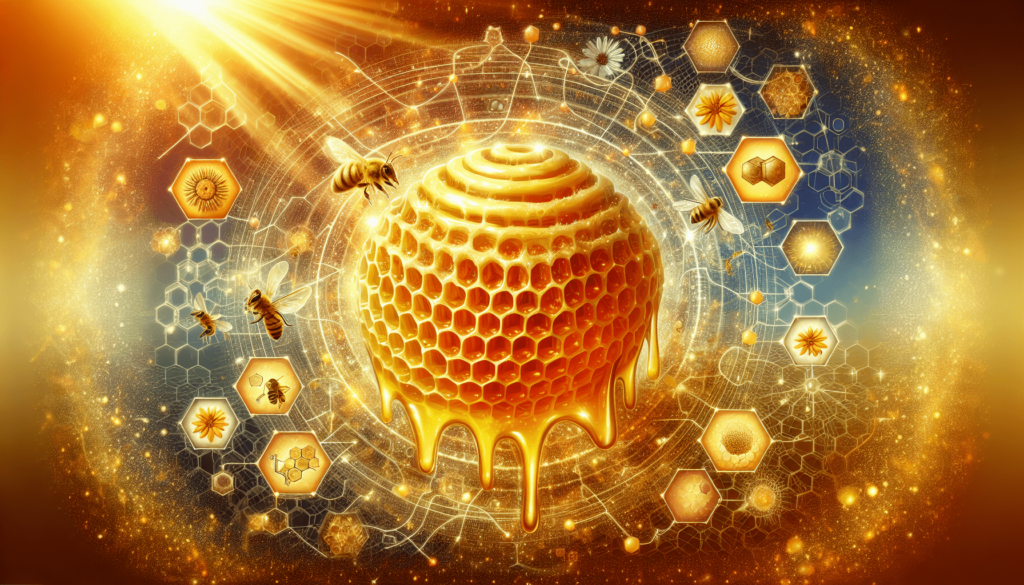If you’ve ever found yourself drizzling honey over your morning toast or adding a spoonful to your cup of tea, you might have wondered whether consuming honey comes with any potential risks or side effects. It’s a valid question, considering the vast array of food and beverage options available to us. In this article, we’ll explore the potential risks and side effects associated with consuming honey, so that you can make an informed decision about incorporating it into your diet. So, let’s get started and uncover the truth behind this golden sweetener.

Allergic Reactions
Risk of Allergies
When it comes to allergic reactions, honey is not exempt. While rare, some individuals may experience an allergic reaction to honey. This is typically attributed to the pollen and other substances present in honey, such as bee venom. If you have a known allergy to bees or pollen, it is important to exercise caution when consuming honey as it may trigger an allergic response.
Symptoms of Allergic Reactions
Allergic reactions can manifest in a variety of ways, depending on the individual. Common symptoms include itching, swelling, and redness of the skin, hives or rash, sneezing, coughing, or a runny nose. In more severe cases, individuals may experience difficulty breathing, wheezing, or even anaphylaxis, which is a potentially life-threatening reaction. If you experience any of these symptoms after consuming honey, it is essential to seek medical attention immediately.
Severe Allergic Reactions
While severe allergic reactions to honey are rare, it is crucial to be aware of their potential. Anaphylaxis, a severe and potentially life-threatening allergic reaction, can occur in response to the proteins found in honey. The symptoms of anaphylaxis may include difficulty breathing, a drop in blood pressure, rapid heartbeat, dizziness, and loss of consciousness. If you or someone you know experiences these symptoms after consuming honey, it is vital to call emergency services immediately.
Infant Botulism
Introduction to Infant Botulism
Infant botulism is a rare but serious condition that can occur in infants under the age of one. It is caused by a toxin called Clostridium botulinum, which is naturally present in the environment and can be found in soil, dust, and even honey. When ingested, the spores of this bacterium can germinate and produce toxins in the baby’s intestines, leading to a range of symptoms.
Risk of Infant Botulism
Infants are at a higher risk of developing botulism due to their immature digestive systems. Unlike adults, their digestive tracts may not be able to prevent the growth and colonization of the bacterium responsible for infant botulism. It is important to note that not all babies who consume honey will develop infant botulism, but the risk remains significant enough to avoid giving honey to infants.
Why Honey Poses Risk to Infants
Honey is a known source of Clostridium botulinum spores. While adults and older children with fully developed immune systems can handle the spores without issue, infants lack the necessary defenses to fight off the toxin-producing bacterium. Additionally, the low acidity of a baby’s digestive system provides an ideal environment for the bacterium to thrive and produce toxins. It is, therefore, crucial to refrain from giving honey to infants, even in small amounts, to prevent the risk of infant botulism.
Contamination
Introduction to Contamination
Honey, like any food product, can be susceptible to various forms of contamination. This can occur during the production, processing, or packaging stages. Proper storage and handling practices are essential to mitigate the risk of contamination and ensure the safety of the honey we consume.
Presence of Pollen
One potential source of contamination in honey is the presence of pollen. While pollen is a natural component of honey and contributes to its flavor and aroma, it can also introduce allergens that could trigger an allergic reaction in susceptible individuals. Therefore, individuals with known pollen allergies should exercise caution when consuming honey.
Pesticide Residues
Another aspect of contamination to consider is pesticide residues. Bees may interact with plants that have been treated with pesticides, and traces of these chemicals can potentially be transferred to the honey they produce. To minimize exposure to pesticide residues, it is advisable to choose honey that is labeled as organic or produced in areas where pesticide use is strictly regulated.
Heavy Metal Contamination
Honey can also be susceptible to heavy metal contamination, such as lead or cadmium, which can find their way into the soil or water surrounding beekeeping areas. These heavy metals can then be absorbed by plants, eventually ending up in the honey. It is essential to ensure that honey producers follow rigorous quality control measures to prevent or minimize the presence of heavy metals in their products.

Unsafe for Infants
Introduction to Infants and Honey
While honey is generally considered safe for the majority of the population, it poses potential risks and dangers when consumed by infants. Due to the factors discussed earlier, such as the risk of infant botulism and the potential for allergenic reactions, it is strongly advised to avoid giving honey to infants under the age of one.
Potential Harmful Bacteria in Honey
Apart from the risk of infant botulism, honey can contain other harmful bacteria, such as Clostridium perfringens and Salmonella, which can cause severe illness in infants. Their underdeveloped immune systems make them particularly susceptible to these bacteria, making it crucial to prevent their exposure to honey during the first year of life.
Immature Digestive System
Infants have fragile and immature digestive systems that are still developing and adapting to solid foods. Honey, despite being a natural product, can be difficult for their digestive systems to process properly. The sugars present in honey, although natural, can overwhelm an infant’s delicate digestive system, potentially leading to digestive discomfort or other digestive issues.
High Sugar Content
Effect on Blood Sugar Levels
Honey is known for its high sugar content, consisting mainly of fructose and glucose. While it may be a more natural alternative to refined sugars, it can still have an impact on blood sugar levels, particularly in individuals with diabetes or those struggling to manage their blood sugar levels. It is important for individuals with diabetes to consult with their healthcare provider before incorporating honey into their diet.
Risk for Diabetic Individuals
For individuals with diabetes, managing blood sugar levels is a crucial aspect of their daily routine. The added sugar content in honey can pose challenges in maintaining stable blood sugar levels. It is important to note that honey should be consumed in moderation and in combination with a well-balanced meal plan tailored to individual needs. Regular blood sugar monitoring and guidance from a healthcare professional are essential for diabetic individuals.
Weight Gain
Caloric Content of Honey
Honey is known for its energy-dense nature, primarily due to its high sugar content. While it can provide a quick source of energy, excessive consumption of honey can lead to unintended weight gain. The calories consumed from honey can quickly add up, especially when it is used in large quantities or added to sweetened beverages and foods.
Unintended Weight Gain
Weight gain occurs when there is an imbalance between calories consumed and calories burned. While honey can be a part of a healthy diet when consumed in moderation, excessive consumption can contribute to weight gain over time. It is important to be mindful of portion sizes and overall calorie intake to maintain a healthy weight.
Toxic Honey
Grayanotoxins in Honey
There is a specific concern associated with honey produced from certain types of plants, such as rhododendron and azalea. These plants contain grayanotoxins, a natural chemical compound that can be transferred to honey. Consumption of honey containing high levels of grayanotoxins can lead to a condition known as grayanotoxin poisoning.
Symptoms of Grayanotoxin Poisoning
Grayanotoxin poisoning can manifest with various symptoms, which usually begin shortly after consuming honey contaminated with grayanotoxins. These symptoms can include dizziness, weakness, nausea, vomiting, excessive saliva production, and even a temporary paralysis of muscles. It is essential to seek medical attention if you experience these symptoms after consuming honey, especially if you suspect it may be contaminated with grayanotoxins.
Dental Issues
Effects on Tooth Decay
While honey is often perceived as a natural sweetener, it contains sugars that can contribute to tooth decay. The presence of sugar in honey can promote the growth of harmful bacteria in the mouth, leading to the production of acids that can erode tooth enamel over time. Practicing good oral hygiene, such as regular brushing and flossing, is essential to maintain dental health, even when consuming honey in moderation.
Risk for Dental Health
Individuals who consume excessive amounts of honey or have poor oral hygiene practices are at a higher risk of developing dental problems. Tooth decay, cavities, and gum disease are some potential consequences of frequent or prolonged exposure to the sugars present in honey. It is crucial to maintain a balanced diet and prioritize proper dental care to minimize the risk of these dental issues.
Potential for Antibiotic Resistance
Presence of Antibiotic Residues
The use of antibiotics in beekeeping practices, although not widespread, can result in the presence of antibiotic residues in honey. This can be a concern as long-term exposure to low levels of antibiotics can contribute to the development of antibiotic resistance in bacteria, making it harder to treat bacterial infections in the future.
Effect on Human Microbiome
The human microbiome, composed of trillions of microorganisms that inhabit our bodies, plays a crucial role in our overall health and immune function. The presence of antibiotic residues in honey can disrupt the delicate balance of the microbiome, potentially leading to dysbiosis and associated health issues. While the extent of this impact may vary, it is important to be aware of the potential consequences of consuming honey containing antibiotic residues.
Adulterated Honey
Introduction to Adulteration
Adulteration refers to the act of adding substances to honey or manipulating its composition to increase profits or deceive consumers. Adulterated honey can contain added sugars, syrups, or other low-quality ingredients. Consuming adulterated honey not only compromises its nutritional value but also poses potential health risks.
Added Sugars
Adulterated honey often contains added sugars, such as high-fructose corn syrup or rice syrup. These added sugars can significantly alter the nutrient composition of honey and contribute to an increased risk of health issues such as obesity, insulin resistance, and tooth decay. It is important to choose honey from reputable sources and read labels carefully to ensure the purity and quality of the product.
Lack of Nutritional Value
Adulterated honey typically lacks the nutritional value of pure, unadulterated honey. The manipulation or addition of low-quality ingredients dilutes or removes the naturally occurring vitamins, minerals, antioxidants, and enzymes that make honey a nutritious food. Choosing pure, unadulterated honey ensures that you can enjoy its full range of health benefits.
In conclusion, while honey is a beloved natural sweetener and has been valued for its various health benefits, it is essential to be aware of the potential risks and side effects associated with its consumption. Allergic reactions, the risk of infant botulism, contamination, its impact on blood sugar levels and weight gain, toxic honey, dental issues, antibiotic resistance, and adulteration are all important factors to consider when incorporating honey into your diet. By being informed and practicing moderation, you can enjoy the natural goodness of honey while prioritizing your health and well-being.

